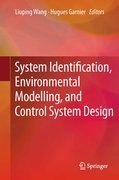
System identification, environmental modelling, and control system design
Wang, Liuping
Garnier, Hugues
This book is dedicated to Prof. Peter Young on his 70th birthday. Professor Young has been a pioneer in systems and control, and over the past 45 years he has influenced many developments in this field. This volume comprises a collection of contributions by leading experts in system identification, time-seriesanalysis, environmetric modelling and control system design – modern researchin topics that reflect important areas of interest in Professor Young’s research career. Recent theoretical developments in and relevant applications of these areas are explored treating the various subjects broadly and in depth. Theauthoritative and up-to-date research presented here will be of interest to academic researcher in control and disciplines related to environmental research, particularly those to with water systems. The tutorial style in which many of the contributions are composed also makes the book suitable as a source of study material for graduate students in those areas. Provides the reader with powerful statistical modelling techniques for thebetter understanding and control of environmental and biological systems. Gives the reader insight into important current control design and system identification methods with illustrative applications. Written by experts. INDICE: Data-Based Mechanistic Modelling. A Minimum Distortion Nonlinear Filtering Approach to System Identification at Fast Sampling Rates. How Accurate Can Instrumental Variable Models Become? - Averaging Analysis of Adaptive Algorithms Made Simple. Identifiability and Beyond. Graphs for Dependence and Causality in Multivariable Time Series. Optimal refined instrumental variable methods for identification of LPV output-error and box Jenkins models. An IV based Iterative Linear Regression Algorithm with Optimal Output Error Properties. Box-Jenkins Seasonal Models. On Estimating Transfer Functions with Non-linearities in the Input. State Dependent Regressions and Smoothing Spline ANOVA Models. Error and Uncertainty in the Structure of a Model: a Philosophical Perspective. Problems with Parametric Models. Multi-state Dependence Parameter Model Identification and Estimation. System Identification in Phloem Physiology. Teaching Modelling and Hydrological Concepts using IHACRES-TAMBO. Removal of Resuscitation Artifacts from Human ECG Signals. Construction of Radial Basis Function Networks with Diversified Topologies. State Dependent Parameter Models and Control. Iterative Learning Control: Engineering and Human Centered Applications. Event-driven Predictive Control with Constraints. Linear Non-minimal State Space Control. An Operational Application of DBM Catchment Modelling for Real-time Flood Forecasting. Analyzing the Complexity of Hydrologic Systems using a Data-based Mechanistic Approach. Modelling and Analysis ofEnvironmental Systems without Time-series Data. The Identification and Control Challenges of Water Resource Managementon a Basin Scale. Application of Optimal Non-stationary Time Series Analysis to Water Quality and Pollutant Transport Modelling. Modelling Strategies for Prediction of the Effects of Land Use and Land Management Change. Bayesian Total Error Analysis in Hydrological Modelling. Modelling for Control Design of Rivers. Advances in Integrated Planningand Management of Water Quantity and Quality in Lakes and Reservoirs. Application of the Aggregated Dead Zone Model of Fluvial Transport of Solutes to Large Rivers. Chaos Theory for Modelling Environmental Systems: Philosophy and Pragmatism. Dynamic Data-based Modelling as basis for Controlling and Understanding Biological Systems. Electrical Demand Modeling and Forecast using StateDependent Parameter Models.
- ISBN: 978-0-85729-973-4
- Editorial: Springer London
- Encuadernacion: Cartoné
- Páginas: 674
- Fecha Publicación: 31/10/2011
- Nº Volúmenes: 1
- Idioma: Inglés
